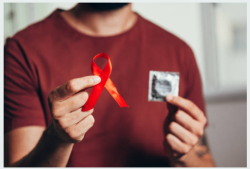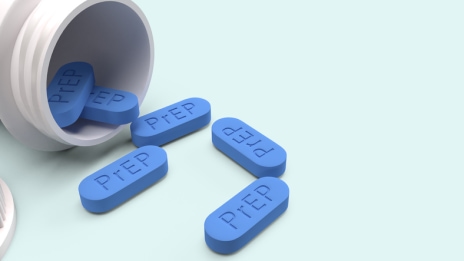

At Friends of Family Health Center, our unwavering commitment is to HIV prevention for those at risk. We foster a supportive and non-judgmental environment, ensuring that everyone feels respected and understood. Our community outreach program features the latest HIV preventive treatment options and a question hotline, empowering individuals to make informed decisions about their health.
Learn more: HIV Testing | PEP | DoxyPEP | PrEP | HIV Education Hotline
Human Immunodeficiency Virus is a virus that weakens a person’s immune system by destroying important cells that fight disease and infection. If left untreated, a person can begin to develop AIDS (Autoimmune Deficiency Syndrome). AIDS is the fourth stage of the HIV infection. Once a person has developed AIDS, their immune system becomes so weak that they can no longer fight off diseases. Although there are current on-going studies for a vaccine, there is currently no cure for HIV. HIV is considered a chronic disease. This means it requires lifelong treatment. An individual receiving proper HIV medical care, can live a long and healthy life. People can live with HIV for years without any signs and symptoms. Not every person with HIV will go on to develop AIDS.
In order for HIV to be transmitted it must get from the body of a HIV positive person into the body of another person.
HIV is found in:
Transmission can occur through:

Getting tested for HIV is crucial for maintaining your health and safeguarding your loved ones. We provide three types of tests depending on when you believe you were exposed to HIV. Remember that no HIV test can detect the virus immediately after exposure due to the window period—the time between exposure and test detection. The window period varies depending on the test type. If you suspect recent exposure, consider seeking post-exposure prophylaxis (PEP) promptly. Always consult your health care provider to determine the most suitable HIV test for your situation.
Nucleic Acid Test (NAT)—A NAT can usually tell if you have HIV infection 10 to 33 days after exposure. It is performed by a lab on blood from your vein. Results take 1 to 2 weeks.
Antigen/Antibody Test—An antigen/antibody test performed by a laboratory on blood from your vein can usually detect HIV infection 18 to 45 days after exposure. Lab results take 1 to 2 weeks.
*An antigen/antibody test done with blood from a finger prick takes longer to detect HIV (18 to 90 days after an exposure). These results take 30 minutes.
Antibody Test—An antibody test can usually detect HIV infection 23 to 90 days after an exposure. There are various Antibody Tests available. Most rapid tests and self-tests are antibody tests. In general, antibody tests that use blood from a vein detect HIV sooner after infection than tests done with blood from a finger prick or with oral fluid. Many antibody tests give results in 30 minutes or less.
OraQuick is a commonly available antibody test.
PEP (Post-Exposure Prophylaxis) is the use of antiretroviral drugs after a single high-risk event to stop HIV acquisition. PEP must be started as soon as possible to be effective—and always within 72 hours of a possible exposure.
Though not for the prevention of HIV, DoxyPEP is often intertwined. Doxycycline Post-Exposure Prophylaxis (DoxyPEP) means taking the antibiotic doxycycline after unprotected sexual activity to prevent getting a sexually transmitted infection (STI). This type of treatment only works at preventing bacterial STIs such as syphilis, gonorrhea, and chlamydia. Prevention is not 100%. Studies show that DoxyPEP can reduce syphilis and chlamydia transmission by 74%-88%, and gonorrhea by 55%-57%.
Further information:
HIV Meds Update: DoxyPEP - Doxycycline for STI Prevention
Don't Take Chances: Why Doxycycline is a Great
Bet Against STIs
DoxyPEP for
STI Prevention
PrEP (Pre-Exposure Prophylaxis) is a prescribed anti-retroviral (ARV) medication that is given to HIV-negative people in order to prevent HIV transmission. PrEP was first approved for use in the United States in 2012.
PrEP works by stopping HIV from taking hold and spreading throughout the body. By taking PrEP the individual reduces the chance of getting HIV from having sex without a condom, and from sharing needles or equipment to inject or use drugs. This medication can be taken orally or by injection. PrEP will not protect against STIs.
HIV Negative
At substantial risk of HIV Exposure
Willingness to use PrEP as prescribed
Creatinine Clearance
The majority of PrEP treatment costs are covered by most health insurance programs (including medical). It's as ordinary as paying for any other prescription for many folks. If you're uninsured or can't afford your out-of-pocket payments, the patient assistance programs listed below may be a great resource. The Federal Poverty Level (FPL) is used in each program to determine a person's income.
https://www.gileadadvancingaccess.com/copay-coupon-card
https://copays.org/funds/hiv-aids-and-prevention/
https://panfoundation.org/disease-funds/hiv-treatment-and-prevention/
https://www.mygooddays.org/patients/diseases-covered/hiv-aids-treatment-and-prevention
https://apretude.com/apretude-cost/

Primary Specialties
Family & Internal Medicine
Languages Spoken
English, Spanish (conversational), Tagalog (conversational)
Physician Bio
Dr. Andrade joined Friends of Family Health Center in 2019. She was soon after appointed Director of Medical Services for her outstanding dedication to the clinic. In 2020, she was appointed Director of QA/QI in addition to her Medical Director duties. In 2022 and 2023, Dr. Andrade was pivotal in leading and facilitating providers and staff through our conversion to the Epic electronic medical record system. She was later appointed Director of Clinical Informatics, for her advanced knowledge of the Electronic Health Record system and reporting.
Dr. Andrade was raised in Whittier, California. She is a first-generation college graduate and the first physician in her family. During her undergraduate education, she studied Molecular and Cell Biology, as well as Psychology, at UC Berkeley. She then attended the University of Washington School of Medicine earning her Doctorate degree. Dr. Andrade went on to complete her residency in Family Medicine at Long Beach Memorial Medical Center. During her residency, she obtained additional training in obstetrics and maternal care, and was Chief Resident of her class.
Having personally experienced a childhood without access to medical or dental care, Dr. Andrade is dedicated to providing care in underserved communities. Dr. Andrade encourages her patients to play an active role in their health. She focuses on preventative care services to adults and the elderly, HIV preventative care (PrEP, PEP), prenatal care, and women’s health.
Dr. Andrade speaks conversational Spanish and Tagalog, providing culturally competent care to our diverse patient population. Dr. Andrade is married with two children. When not in the office, she spends her time with her family and enjoys concerts, comedy shows, plays, running, baking, and then running some more to eat what she bakes.
Primary Specialty
Family Medicine
Languages Spoken
English, Mandarin, Taiwanese
Physician Bio
Dr. Liu is an experienced family doctor. Dr. Liu’s patients appreciate the warmth, professional integrity, and open communication that define her as a provider. Dr. Liu is determined to help her patients understand their own health so they can be well informed when making important health decisions. Dr. Liu treats diabetes, high blood pressure, depression, anxiety, lower back pain, trigger point injection, Diabetes, cholesterol, high blood pressure and urinary track infection, etc. Dr. Liu also performs pap smear and annual physical examination.
Education
Doctor Liu’s Education and training: Medical School - A.T. Still University, Kirksville, Doctor of Osteopathic Medicine, Highlands Regional Medical Center, Residency in Family Medicine, Moberly Regional Medical Center (Internship).
Primary Specialties
Family Medicine (Board Certified)
Languages Spoken
English and Spanish (conversational)
Physician Bio
With a deep commitment to patient-centered care, Dr. LaCaze focuses on empowering individuals to take control of their own health and works with them to help them make informed decisions about their own well-being.
Dr. LaCaze completed her Family Medicine Residency at Long Beach Memorial Medical Center, specializing in Community Medicine. She earned her Doctor of Medicine (MD) degree from Virginia Commonwealth University (VCU) School of Medicine, where she was involved in the Family Medicine Scholars Training and Admission Program. Her academic journey also includes a Master of Public Health (MPH) with a concentration in Epidemiology from the University of California, Irvine (UCI), where she received the Academic Excellence Award. Prior to that, Dr. LaCaze obtained a Bachelor of Science in Biological Sciences from UCI.
Her goal as a provider is to offer comprehensive care with a strong emphasis on both prevention and education, particularly in underserved communities. Dr. LaCaze is dedicated to providing culturally competent care and ensuring that all patients feel supported and informed. Dr. LaCaze has a special interest in pediatrics, women’s health, and HIV preventative care.
Outside of her professional life, she enjoys reading, traveling, and experiencing different cultures and cuisines. Dr. LaCaze is also an avid participant in a Dungeons & Dragons group, where she tackles fantastical challenges with her party, including battling werewolves, tomb spiders, and the occasional goose overlord.
Dr. LaCaze is excited to continue serving the community and making a positive impact on her patients' lives through compassionate and preventative care. She firmly believes and embodies the idea that “health” is more than just medicine.
Primary Specialty
Family and Community Medicine
Languages Spoken
English and Spanish
Physician Bio
Dr. Bonilla is a dedicated physician who was born in West Covina, California, and has spent the majority of their life in Southern California. They pursued their passion for medicine at UC Riverside School of Medicine and further honed their skills during their residency at UC San Francisco in family and community medicine.
Dr. Bonilla's journey into the medical field was deeply rooted in their personal experiences. As a child, they played a vital role in interpreting for their parents and guiding them through the complexities of the healthcare system, especially during their grandmother's illness. This experience ignited a strong sense of purpose in Dr. Bonilla, motivating them to become a Doctor who could bridge the language and cultural gaps, particularly for the Spanish-Speaking community.
Today, Dr. Bonilla continues to be a compassionate advocate for their patients, driven by their commitment to providing quality care and support to those in need, especially within the Latino community. On his free time, he loves to plan his next trips, hang out with friends, enjoy new music, and try out new foods.


AIDS Healthcare Foundation. (2022, March 24). HIV Education is Prevention – Learn More on HIVCare.org. HIV Care.
Weiss R. A. (2000). Getting to know HIV. Tropical medicine & international health: TM &
IH, 5(7), A10–A15.
HIV Basics. HIV.gov. (2022, June 8). Retrieved June 9, 2022
(2022). Retrieved 2 June 2022, fom https://www.cdc.gov/hiv/default.html